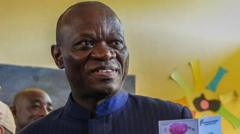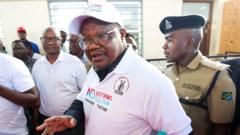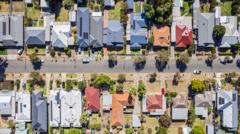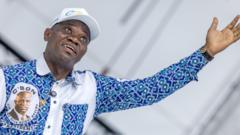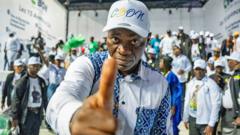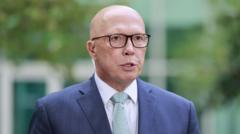For the first time in decades, Gabon's presidential election will not feature a member of the Bongo family on the ballot. Following the coup by General Brice Oligui Nguema, who ousted former President Ali Bongo 19 months prior, the political landscape has shifted significantly. Nguema’s rise has been accompanied by changes to the constitution that allow him to stand as a candidate in the electoral race slated for Saturday.
**Gabon Votes: A New Chapter Post-Coup as Election Draws Attention**
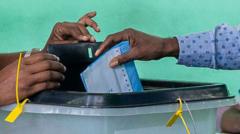
**Gabon Votes: A New Chapter Post-Coup as Election Draws Attention**
As Gabon heads to the polls for a pivotal presidential election, citizens hope for change after a coup deposed a long-standing regime.
A competitive field of eight candidates is vying for leadership, including former Prime Minister Alain Claude Bilie-by-Nze, who has faced scrutiny due to his ties with the previous Bongo administration. Among the candidates stands Gninga Chaning Zenaba, the only woman in the election. The results are expected to be released soon after polls close, though counting may extend into the following week.
With an electorate of nearly one million, including those in the diaspora, the nation grapples with economic challenges despite its oil and timber wealth, where around 35% live on less than $2 a day. Many candidates focused their campaigns on reaching voters in rural areas, while it's noted that Nguema's presence dominates advertising in the capital, Libreville.
Supporters like taxi driver Landry Obame-Mezui praise Nguema for his promises of action and governance reform. In contrast, critics accuse him of manipulating the electoral process and designing rules that favor his candidacy, including an upper age limit that rendered popular opponent Albert Ondo Ossa ineligible.
Voters express a desire for genuine reform. Public sentiment reflects a longing for a government that addresses systemic corruption, unemployment, and improves social equity. A registered voter, Noel Kounta, shares hopes for a well-managed nation, while 30-year-old pharmacist Shonnys Akoulatele emphasizes the urgent need for job creation amidst high unemployment rates.
As anticipation builds ahead of the election, Gabon stands at a crossroads between its tumultuous past and the potential for a more democratic future.
Polls are scheduled to close at 6 PM local time (5 PM GMT) on Saturday.
With an electorate of nearly one million, including those in the diaspora, the nation grapples with economic challenges despite its oil and timber wealth, where around 35% live on less than $2 a day. Many candidates focused their campaigns on reaching voters in rural areas, while it's noted that Nguema's presence dominates advertising in the capital, Libreville.
Supporters like taxi driver Landry Obame-Mezui praise Nguema for his promises of action and governance reform. In contrast, critics accuse him of manipulating the electoral process and designing rules that favor his candidacy, including an upper age limit that rendered popular opponent Albert Ondo Ossa ineligible.
Voters express a desire for genuine reform. Public sentiment reflects a longing for a government that addresses systemic corruption, unemployment, and improves social equity. A registered voter, Noel Kounta, shares hopes for a well-managed nation, while 30-year-old pharmacist Shonnys Akoulatele emphasizes the urgent need for job creation amidst high unemployment rates.
As anticipation builds ahead of the election, Gabon stands at a crossroads between its tumultuous past and the potential for a more democratic future.
Polls are scheduled to close at 6 PM local time (5 PM GMT) on Saturday.




